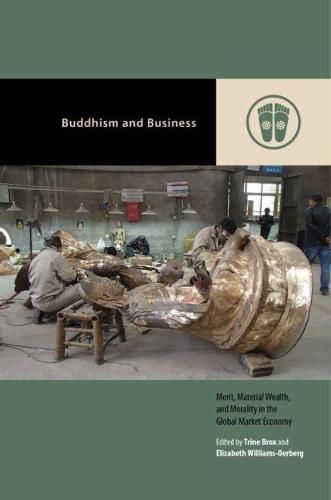Readings Newsletter
Become a Readings Member to make your shopping experience even easier.
Sign in or sign up for free!
You’re not far away from qualifying for FREE standard shipping within Australia
You’ve qualified for FREE standard shipping within Australia
The cart is loading…






Although Buddhism is known for emphasizing the importance of detachment from materiality and money, in the last few decades Buddhists have become increasingly ensconced in the global market economy. The contributors to this volume address how Buddhists have become active participants in market dynamics in a global age, and how Buddhists and non-Buddhists alike engage Buddhism economically. Whether adopting market logics to promote the Buddha’s teachings, serving as a source of semantics and technologies to maximize company profits, or reacting against the marketing and branding of the religion, Buddhists in the twenty-first century are marked by a heightened engagement with capitalism.
Eight case studies present new research on contemporary Buddhist economic dynamics with an emphasis on not only the economic dimensions of religion, but also the religious dimensions of economic relations. In a wide range of geographic settings from Asia to Europe and beyond, the studies examine institutional as well as individual actions and responses to Buddhist economic relations. The research in this volume illustrates Buddhism’s positioning in various ways-as a religion, spirituality, and non-religion; an identification, tradition, and culture; a source of values and morals; a world-view and way of life; a philosophy and science; even an economy, brand, and commodity. The work explores Buddhism’s flexible and shifting qualities within the context of capitalism, and consumer society’s reshaping of its portrayal and promotion in contemporary societies worldwide.
$9.00 standard shipping within Australia
FREE standard shipping within Australia for orders over $100.00
Express & International shipping calculated at checkout
Although Buddhism is known for emphasizing the importance of detachment from materiality and money, in the last few decades Buddhists have become increasingly ensconced in the global market economy. The contributors to this volume address how Buddhists have become active participants in market dynamics in a global age, and how Buddhists and non-Buddhists alike engage Buddhism economically. Whether adopting market logics to promote the Buddha’s teachings, serving as a source of semantics and technologies to maximize company profits, or reacting against the marketing and branding of the religion, Buddhists in the twenty-first century are marked by a heightened engagement with capitalism.
Eight case studies present new research on contemporary Buddhist economic dynamics with an emphasis on not only the economic dimensions of religion, but also the religious dimensions of economic relations. In a wide range of geographic settings from Asia to Europe and beyond, the studies examine institutional as well as individual actions and responses to Buddhist economic relations. The research in this volume illustrates Buddhism’s positioning in various ways-as a religion, spirituality, and non-religion; an identification, tradition, and culture; a source of values and morals; a world-view and way of life; a philosophy and science; even an economy, brand, and commodity. The work explores Buddhism’s flexible and shifting qualities within the context of capitalism, and consumer society’s reshaping of its portrayal and promotion in contemporary societies worldwide.